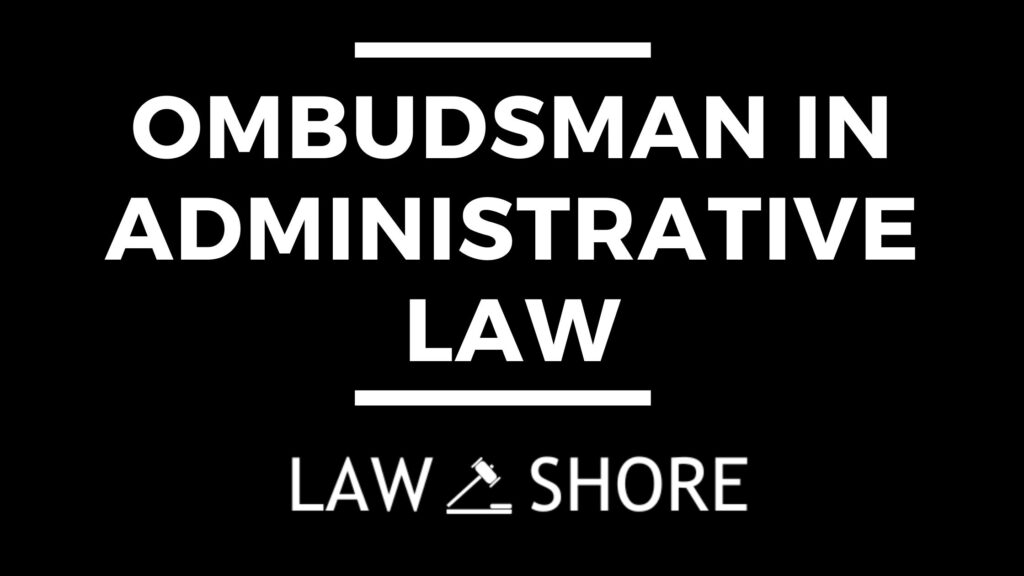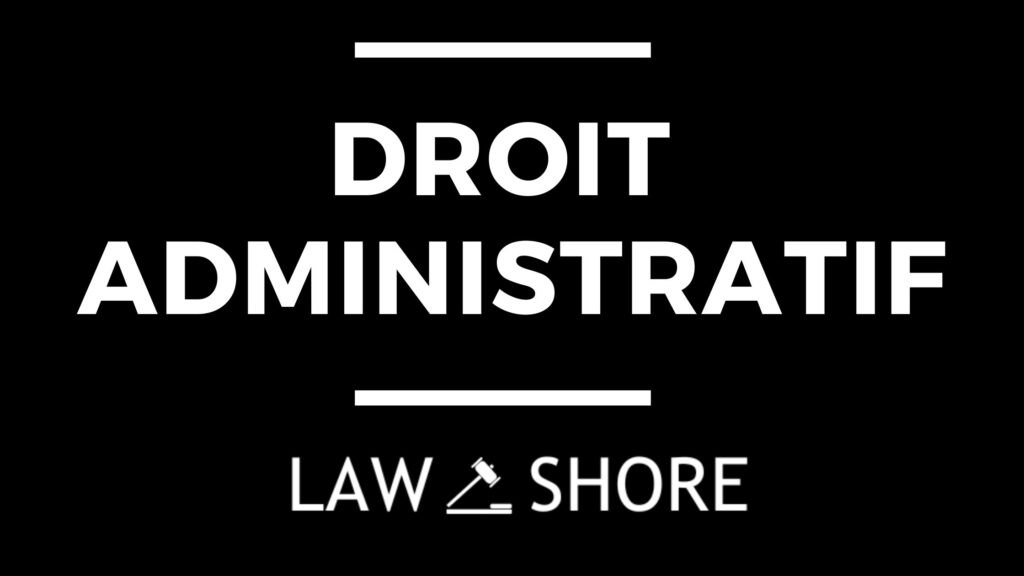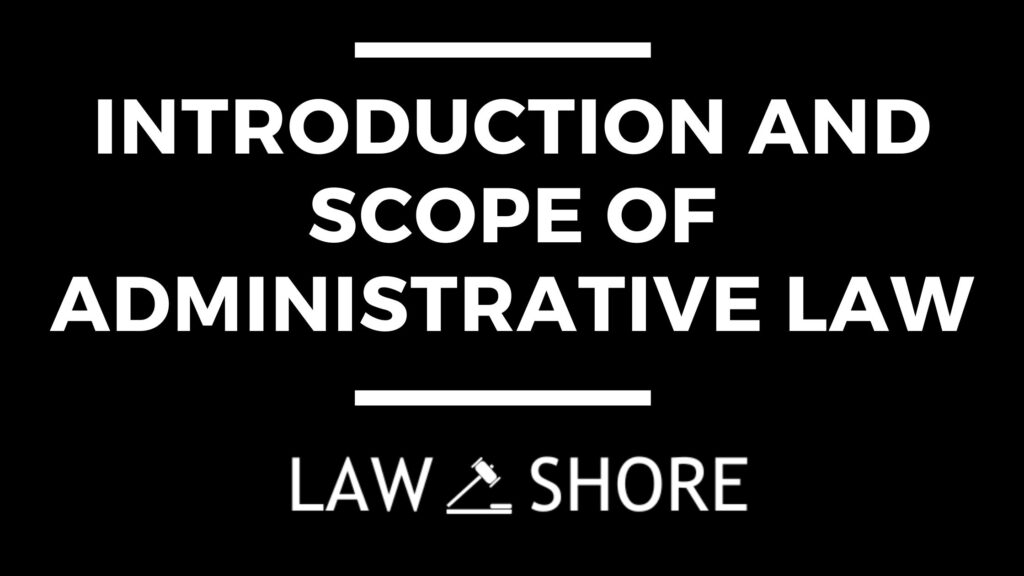Meaning of Ombudsman in Administrative Law
Table of Contents
ToggleOmbudsman in administrative law, is a critical mechanism for ensuring transparency, accountability, and fairness in the functioning of public institutions. It provides a platform for individuals to raise concerns about the actions of public officials, thus preventing abuse of power and ensuring that the administration functions within the boundaries of law and justice.
An Ombudsman is an independent, impartial body or official appointed to investigate complaints from individuals or groups about the functioning of public authorities or the administration. The role of the Ombudsman is to address grievances related to maladministration, injustice, or abuse of power in governmental and other public-sector institutions. The Ombudsman serves as a channel through which citizens can seek redress when they believe that government agencies have acted improperly or unfairly.
Importance of Ombudsman in Administrative Law
The institution of the Ombudsman holds significant importance in administrative law for the following reasons:
- Enhancing Accountability: The Ombudsman ensures that government officials and public authorities are held accountable for their actions, making sure they adhere to laws, regulations, and ethical standards.
- Protecting Citizens’ Rights: By investigating complaints of maladministration and injustice, the Ombudsman protects the rights of citizens, ensuring that their grievances are addressed.
- Promoting Transparency: The Ombudsman promotes transparency by investigating complaints and making findings public, which helps foster trust between the public and the government.
- Providing Accessible Redress: The Ombudsman provides a relatively simple and low-cost mechanism for individuals to seek redress, without the need for complex legal processes or litigation.
- Preventing Corruption: Through its oversight and investigative functions, the Ombudsman helps uncover cases of corruption, ensuring that public servants are not above the law.
Origin of the Concept of Ombudsman
The concept of the Ombudsman originated in Sweden in the 19th century. The Swedish term “Justitieombudsman” referred to an official responsible for ensuring that government agencies operated within the framework of the law and in accordance with justice. Sweden established the first Ombudsman in 1809, after the country adopted a constitution that emphasized individual rights and the need for public officials to be held accountable.
The Swedish Ombudsman was empowered to investigate complaints of maladministration by public authorities, particularly those related to the abuse of power or the violation of legal rights. The success of the Swedish model inspired other countries to adopt similar systems, leading to the spread of the Ombudsman institution across Europe, and eventually the world.
In the 20th century, many countries, including India, began to develop their own versions of the Ombudsman, adapting the institution to their unique political and legal contexts.
Types of Ombudsmen
The term “Ombudsman” has evolved over time to encompass several different models, depending on the nature and purpose of the office. Below are the various types of Ombudsmen:
Organisational Ombudsman
- An Organisational Ombudsman functions within a specific organization or institution, such as a company, university, or non-governmental organization. This type of Ombudsman helps resolve internal disputes, addresses concerns of employees or stakeholders, and ensures that the organization’s policies are fair and just. Organizational Ombudsmen typically focus on resolving issues related to workplace fairness, discrimination, harassment, and ethical concerns.
Classical Ombudsman
- The Classical Ombudsman is typically associated with the public sector and operates independently of the government to address complaints from citizens about public administration. This Ombudsman investigates cases of maladministration, abuses of power, and violations of individuals’ rights by public authorities. The Classical Ombudsman is a key figure in ensuring the accountability of government agencies and public officials.
Advocate Ombudsman
- An Advocate Ombudsman represents the interests of individuals, often marginalized or vulnerable groups, in their interactions with public institutions. The primary focus of an Advocate Ombudsman is to advocate for citizens’ rights, assist in the pursuit of justice, and ensure that the government complies with legal and ethical standards. This type of Ombudsman may also serve as a mediator between the public and public authorities.
Hybrid Ombudsman
- A Hybrid Ombudsman combines the functions of both a Classical Ombudsman and an Advocate Ombudsman. This type of Ombudsman investigates complaints against public authorities and advocates for the rights of individuals. Hybrid Ombudsmen may possess a range of investigative powers, including the ability to intervene in specific cases and offer recommendations for reforms in policy or practice.
Legislative Ombudsman
- The Legislative Ombudsman is closely linked with the legislature and is typically tasked with ensuring that government actions are consistent with the law and the principles of democracy. Legislative Ombudsmen may have the authority to investigate the activities of the executive branch and may report their findings directly to the legislature. Their function is particularly focused on maintaining the balance of power between the different branches of government.
Executive Ombudsman
- An Executive Ombudsman operates within the executive branch of government, often focusing on complaints related to the actions of government agencies and civil servants. This Ombudsman is empowered to investigate and resolve grievances that arise from executive decisions, ensuring that executive power is exercised fairly, transparently, and in accordance with the law.
Media Ombudsman
- A Media Ombudsman is an independent figure tasked with addressing complaints related to media organizations and their content. This type of Ombudsman investigates allegations of media bias, ethical violations, inaccuracies in reporting, and privacy violations. Media Ombudsmen play an important role in maintaining the integrity and accountability of the media.
Powers and Functions of Ombudsman in Administrative Law
The Ombudsman is vested with a range of powers and functions that allow it to effectively address grievances and hold public authorities accountable. Some of the key powers and functions include:
- Investigation of Complaints: The Ombudsman has the authority to investigate complaints of maladministration, corruption, and abuse of power by public authorities.
- Recommendation of Action: After conducting investigations, the Ombudsman can recommend corrective actions, including disciplinary measures, changes in policy, or legal action.
- Monitoring Compliance: The Ombudsman monitors the implementation of its recommendations and ensures that public authorities comply with its directives.
- Public Reporting: Ombudsmen often report their findings to the public, thereby ensuring transparency in government actions.
- Advisory Role: The Ombudsman may also advise government agencies on improving procedures and policies to prevent future grievances.
Ombudsman in India
Historical Context of the Ombudsman in India
The idea of an Ombudsman traces its origins to Sweden in the 19th century. The Swedish Ombudsman, or “Justitieombudsman,” was established to supervise the actions of public officials and ensure that government actions were in line with the law and the public interest. Inspired by this model, several countries, including India, adopted the Ombudsman system to strengthen administrative accountability.
In India, the roots of the Ombudsman can be traced back to the 1960s when the need for such an institution was first debated. In 1966, the Swaran Singh Committee suggested the establishment of a mechanism to inquire into complaints against public authorities and administrative failures. However, it was not until the 1990s that concrete steps were taken toward establishing the office of the Ombudsman, notably through the Lokpal and Lokayukta Act, 2013.
In India, the Ombudsman institution is represented primarily through the Lokpal and Lokayuktas. These bodies are designed to address complaints of corruption, abuse of power, and maladministration within the public sector.
- Lokpal: The Lokpal is an independent body at the central level responsible for investigating allegations of corruption against high-ranking public officials, including the Prime Minister, ministers, and members of Parliament.
- Lokayukta: The Lokayukta serves a similar function at the state level, investigating complaints of corruption and maladministration against state officials, including the Chief Minister and other public servants.
Both the Lokpal and Lokayuktas are designed to ensure accountability and transparency in the functioning of government institutions in India.
Salient Features of The Lokpal and Lokayuktas Act, 2013
The Lokpal and Lokayuktas Act, 2013, was enacted to establish the institution of the Lokpal at the central level and the Lokayukta at the state level. Some of its key features include:
- Appointment Process: The Lokpal is appointed by a selection committee comprising the Prime Minister, Leader of Opposition, and Chief Justice of India.
- Jurisdiction: The Lokpal has jurisdiction over all public servants, including the Prime Minister, ministers, and members of Parliament.
- Powers: The Lokpal has the authority to investigate and initiate proceedings against public officials found guilty of corruption or misconduct.
- Whistleblower Protection: The Act provides provisions for protecting whistleblowers who report cases of corruption.
- Complaint Mechanism: The Act allows citizens to lodge complaints directly with the Lokpal or Lokayukta for prompt redressal.
Composition of the Lokpal
The Lokpal is composed of a Chairperson and members, as follows:
- Chairperson: A former Chief Justice of India or a judge of the Supreme Court.
- Members: Four members, including at least two members from amongst the judicial, legal, or administrative backgrounds, and one member each from the fields of public administration, law, and social work.
The selection process ensures that the Lokpal is independent, non-partisan, and competent to handle complex investigations related to corruption.
Understanding Lokpal and Lokayukta: The Indian Ombudsman System
Lokpal
The Lokpal is an anti-corruption authority that investigates complaints against public functionaries, including the Prime Minister, ministers, and members of Parliament. The Lokpal and Lokayukta Act, 2013, was a landmark legislation that formalized the creation of the Lokpal at the central level.
The Lokpal has the following powers and responsibilities:
- Investigate corruption: It has the authority to investigate allegations of corruption and misconduct against public servants, including those holding high office.
- Initiate inquiries: The Lokpal can initiate suo-motu inquiries or investigate complaints filed by citizens.
- Prosecution: After completing an investigation, the Lokpal can recommend the prosecution of public officials in appropriate courts.
- Protection for whistleblowers: The Lokpal is empowered to protect whistleblowers from retaliation by public officials.
The Lokpal is not just a reactive institution but also works proactively to ensure that government institutions are held accountable. The Act also ensures that the complaints are addressed in a timely manner, and transparency is maintained throughout the process.
Lokayukta
The Lokayukta is the state-level counterpart to the Lokpal. Each state in India has the discretion to establish a Lokayukta, with its structure and powers being defined by the respective state governments. The Lokayukta is tasked with investigating complaints related to corruption and misconduct by state-level government officials, including the Chief Minister, ministers, and civil servants.
Some of the key functions of the Lokayukta include:
- Receiving and investigating complaints: Citizens can file complaints regarding corruption or administrative failures in the state government.
- Recommendation for action: Upon concluding an inquiry, the Lokayukta may recommend disciplinary actions against public servants found guilty.
- Encouraging transparency: The Lokayukta’s role also extends to promoting transparency and good governance at the state level.
The establishment of the Lokayukta in each state is crucial in ensuring that the state machinery is accountable and efficient, although the effectiveness of these bodies can vary from state to state.
Functioning and Powers of the Ombudsman in India
Both the Lokpal and Lokayukta serve as mechanisms to address complaints against public administration, but their functioning and powers are different:
- Complaint Resolution: The Ombudsman bodies receive complaints regarding corruption, maladministration, and abuse of power. These complaints can be lodged by any citizen, and the Ombudsman investigates them thoroughly. In some cases, they can recommend punishment or disciplinary action.
- Investigation Powers: The Ombudsman has wide powers of investigation. This includes the ability to summon documents, question witnesses, and recommend actions to higher authorities. However, the Lokpal does not have the power to directly punish offenders but can suggest actions such as suspension or prosecution.
- Transparency: One of the key principles of the Ombudsman system is transparency in government actions. This ensures that government agencies and officials are held accountable for their actions, especially when it comes to public funds or the welfare of citizens.
- Independent and Impartial: Both the Lokpal and Lokayukta are designed to function independently of the government. The appointment process of the Lokpal involves a selection committee comprising the Prime Minister, Leader of Opposition, and Chief Justice of India, ensuring that the body is impartial and not influenced by political or executive powers.
Challenges Faced by the Ombudsman
While the idea of an Ombudsman in India is an important step toward ensuring justice and accountability, the institution faces several challenges:
- Limited Powers: The Ombudsman, particularly at the state level (Lokayukta), often faces limitations in terms of enforceability of its recommendations. Though it can recommend actions, it lacks the direct power to initiate prosecutions or enforce decisions, making it dependent on the government for implementation.
- Political Interference: In some states, political interference has hindered the proper functioning of the Lokayukta. Appointments to the office of Lokayukta, as well as its operations, can be influenced by political considerations, reducing its effectiveness.
- Underutilization: Many citizens are still unaware of the existence of the Lokpal or Lokayukta, and there is a general lack of awareness about the process of filing complaints. As a result, these institutions are underutilized.
- Institutional Capacity: Both the Lokpal and Lokayukta require significant infrastructure, resources, and trained personnel to handle complex investigations. The lack of adequate resources often hampers their ability to function efficiently.
- Delay in Resolution: Like many other administrative and judicial bodies, the Ombudsman system also suffers from delays in resolving cases. This delay in addressing grievances can diminish public trust in the institution.
Conclusion
The Ombudsman institution plays an essential role in promoting accountability, transparency, and justice in administrative systems. In India, the Lokpal and Lokayukta serve as key institutions for addressing complaints of corruption and maladministration. Despite challenges such as political interference and underutilization, these bodies remain integral to improving governance and ensuring that public officials act in accordance with the law and the public interest. As India continues to strengthen its democratic institutions, the effective functioning of the Ombudsman will be vital in ensuring a just and accountable administration.
Also, Check Out Other Topics in Administrative Law:
- Introduction and Scope of Administrative Law
- Droit Administratif
- Promissory Estoppel in Administrative Law
- Public Corporation in Administrative Law
- Judicial Review of Administrative Action
- Reasons for Growth of Administrative Law
- Separation of Powers in Administrative Law
- Doctrine of Ultra Vires in Administrative Law
- Whistleblowing
- Nature of Administrative Law
- Red Light and Green Light Theory of Administrative Law
- Sub Delegation in Administrative Law
- Delegatus Non Potest Delegare
Explore Law Shore: law notes today and take the first step toward mastering the fundamentals of law with ease.

After Completing my LLB hons, I started writing content about legal concepts and case laws while practicing. I finally started Law Shore in 2024 with an aim to help other students and lawyers.



